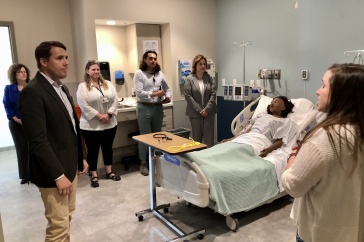
Every day, New Hampshire news outlets carry stories about people arrested for crimes connected to drug abuse or mental illness. But once the cameras are off and the police reports are filed, those same outlets rarely tell the story that comes next. In Strafford County, home to UNH, it’s the story of what happens when offenders enter a criminal justice system that offers a huge array of interconnected services, both inside the jail and out in the community. Run by a team of compassionate professionals, many of them UNH alumni, the Strafford County criminal justice system has a single goal: to help guide offenders toward a future free from crime.
The tools for assembling that future depend on each individual’s needs. The county helps offenders conquer drug or alcohol abuse, get treatment for mental illness, manage anger, earn a high school equivalency certificate, learn English or computer skills, hunt for a job or find affordable medical care. Programs intersect and overlap: Offenders involved in community-based rehab may spend an occasional night in jail, while jail inmates spend their days in the community on work release. Some people battling addictions live in a separate Therapeutic Community at the jail; others live at home while working through their rehab in the community-based Drug Court program. Still others with issues around mental illness participate in the Mental Health Court program.
Developing this network took years of work and collaboration among parties who could easily have been adversaries, like the prosecutors in the county attorney’s office responsible for taking legal action against offenders and the public defense lawyers who represent them. County attorney Tom Velardi ’93, for instance, prosecutes cases but also sees himself as an advocate for both victims and offenders.

Judge Stephen Houran, Alex Casale ’03, and Velardi discuss a case; county program graduate Gary
Anderson ’11.
“Collaborative approaches to criminal justice require more time and effort, but the effort is so worth it when you get exposed to the success stories and see lives change,” Velardi says.
To the county’s criminal justice professionals, the programs they staff are a living, changing web. To the experts, they’re a model. David Bennett, a national criminal justice consultant who has worked with several hundred counties, says Strafford County offers a wider array of programs at the jail and in its Community Corrections department than any other jurisdiction of its size in the country.
As they navigate that network, people who have committed crimes begin to rewrite their own stories.
CLIMBING THE MOUNTAIN
In Drug Court, the story begins with a new name: those who enter the system are no longer known as offenders but rather as clients. Every Monday afternoon, clients file into the county courthouse for Drug Court check-in. Young men in jeans and hoodies, sneakers or work boots, fill the courtroom gallery. Many joke around like high school boys; others keep to themselves. A few young women sit here and there, some joining in the banter of the rowdy group. Inmates in khaki uniforms from the county jail across the street enter quietly and sit in the back row on the right, an officer from the sheriff’s department standing beside them. Everyone in the room knows that before the afternoon’s proceedings are over, a few more may be joining their ranks.
Many Drug Court clients started using drugs before their teens; a few almost died from an overdose or had a friend who did. They’ve been arrested for assault, burglary, drunk driving, possession of drugs, or all of the above; they’ve spent a night—or two weeks, or several months —in jail for crimes related to their addictions.
Now they have committed to taking on the challenge of rehabilitation rather than serving time in the county jail or state prison. Rehab is like climbing the steepest, rockiest mountain on the Appalachian Trail. They’ll stumble and fall, maybe get lost along the way. The professionals can provide proper gear and trail maps, but ultimately each client climbs alone. Some make it; many don’t. Of those who veer off course, many try again and again—as many times as it takes—to reach the summit.

addresses the Drug Court;
Minnett Induisi ’79G
confers with a therapeutic
communities program
participant about her
afghan; Jake Collins ’92,
’15G in the jail library.
When Gary Anderson ’11 was arrested for cocaine possession in 2009, he chose Drug Court over jail, but had no intention of getting sober. He tried to game the system, thinking he could carry his addiction with him up the mountain. Eventually, after failing a drug test that terminated his participation in the program, he went to jail for his original one-year sentence.
In December, Anderson celebrated two years of sobriety. He credits Drug Court for giving him the tools he needed, even though he chose, at first, not to use them. In the end, he says, “I got exactly what I didn’t want, but I got exactly what I needed.”
‘NOT A MORAL DEFICIENCY'
On a recent afternoon, Anderson stopped by the Strafford County courthouse to thank Drug Court director Alex Casale ’03 for the positive impact he and his colleagues had in changing the course of his life.
Casale is one of many UNH alumni in the county criminal justice system—at the jail, in Community Corrections, and in the public defenders and county attorney’s offices. He began as a student interning with a probation officer, then accepted a part-time job taking urine samples. Before long he became a full- time case manager and by age 24, he’d written a policy manual for drug testing. When the Drug Court director moved to another position, he took over the job.
Everyone involved with Drug Court, Casale says, brings a non-adversarial approach to the work. “We’re not there to belittle people and say that there’s something wrong with them because they have these addictions,” he says. “The science says it’s an addiction and you’re supposed to treat it like you would something like diabetes. It’s not a moral deficiency.”
Casale and his colleagues know they may have to stand by and watch as a client struggles—or even gives up. Blair Rowlett ’05, director of the Mental Health Court, has seen it happen. In the grips of mental illness and/or substance abuse, she says, “sometimes it doesn’t work out and people will continue to offend, serve jail time or even die.”
For Anderson, the struggle began before he turned 13. He started drinking and using drugs in junior high, was arrested for smoking marijuana in his high school parking lot, and enrolled in a youth drug-counseling program. At 17, he blacked out on opiates and alcohol and totaled his mother’s Jeep; skid marks indicated he was going 100 mph. His license revoked, on probation, he took classes where he learned something about addiction—and met people he’d go out drinking with.
At UNH he got by for a while, but then he stopped going to classes, forgot to take his finals, and was put on academic probation. Then came his 2009 cocaine arrest. He entered the Drug Court program in February 2011.
Drug Court begins with weekly court visits, daily intensive group and outpatient therapy sessions and scheduled and random drug testing. Each client has different challenges. Casale and his case managers provide support with writing resumes and refer clients to staffing agencies. They help clients get free medical and dental care. And they give advice. When one wanted to get back into working as a tattoo artist, Casale suggested he wait a while. People getting tattoos are sometimes high on drugs—perhaps not the best clientele for a recovering addict.
“Sometimes you have to save them from themselves,” Casale says. He’ll remind a client, “Last time you made that decision, it didn’t work out so well for you.”
ON THE FRONTLINE
Every Monday Casale leads a team meeting to discuss the progress of each Drug Court participant. The team includes caseworkers, counselors, probation officers, the director of transitional housing, the superior court judge, the public defender—and county attorney Velardi.
As the county criminal justice system has evolved, so has the role of the county attorney’s office, which prosecutes criminal cases. Early in his career, Velardi saw that drug offenders sent to state prison often reoffended soon after their release. Today he sees himself as not just a prosecutor but an advocate for both victim and offender. He learns about the unique needs of each offender entering the system, finding out if there are drug or mental health issues that need addressing. “This is a constructive way of making us all safer,” he tells victims.
Velardi serves on both the Drug Court and Mental Health Court teams, working with treatment members and the public defender to help clients stay on track with their rehabilitation while maintaining public safety and accountability to victims. Sometimes a client who breaks the rules gets a second chance; sometimes he or she goes to jail. Velardi also ensures that the Drug Court program follow its own policies, so that law enforcement will stay invested in the process.
“The criminal justice system is the frontline for mental health and addiction issues,” he says. “I feel lucky to work in a county that believes these issues are important and worthy of the time and money spent on running these programs.”
MONITORING THE PATH
Shortly after 2 p.m. on Monday, the Drug Court team enters the courtroom and sits down at the tables in front and in chairs along the side, notebooks open in front of them. All rise when Judge Steven Houran enters.
Houran works his way through the docket quickly, spending two or three minutes with each of the 20 or so clients. First up are those who are meeting their goals. They have started restitution payment plans, found jobs, completed parenting classes. Houran applauds each client’s accomplishments or gives advice on some of the challenges he or she is facing, always focusing on the need for continuing sobriety and meeting the demands of the program.
Then come those with minor offenses. Houran gives a reprimand for being late to group therapy, assigns a work day for a missed therapy appointment or a written apology for rude behavior during group.
Last up are those with the most egregious offenses—usually a positive drug test. Some come from the back row, handcuffs on and ankle chain rattling as they walk up to the judge. They’ll spend two nights in jail and attend daily meetings for 30 days. Houran’s tone remains respectful. “It is a relapse,” he says. “I hope you come out of it focused on the progress you’ve made.”
Everyone in the courtroom understands that the steep climb of recovery doesn’t always move straight ahead. Anyone, anytime, can stumble. Some Mondays as many as seven clients will shuffle across the street for a stay at the Strafford County House of Corrections, where anyone who commits a crime in Strafford County, if not out on bail, awaits trial or sentencing. Those sentenced to a year or less stay there; those with longer sentences serve their time at the state prison.
A WEB OF PROGRAMS
At the jail, the only bars are on the windows. Each cell opens onto the unit’s common area, where inmates are free to move around for most of the day. From his office, county assistant superintendent of programs and education Jake Collins ’92, ’14G oversees a web of programs that is likewise integrated to ensure that inmates, when they are released, leave with the skills and healing they need. It’s a particular point in the system where UNH alums abound. Quinn Brackett ’07, ’09G runs the women’s component of Therapeutic Communities, a program Collins implemented to help inmates move into lives free of drug addiction. Deanna Strand ’86, ’95, ’97G, director of the Dover Adult Learning Center, works with Collins to provide curricula for classes offered at the jail and to hire teachers. Muriel Farrar ’94G teaches adult education classes to help inmates prepare for the high school equivalency exam. Minnett Indusi ’79G teaches parenting and anger management classes, provides one-on-one counseling and assists Farrar in the adult education program. And Isabel Padial ’94 helps inmates access social and community services as they prepare for their release from jail.
Collins, who has worked for the system for 13 years, says that his job is to help inmates move toward more promising futures; others say that description barely scratches the surface of his commitment. For every inmate who earns a high school diploma, for example, Collins holds a graduation ceremony complete with caps and gowns, photos and a reception with cake. “For someone with his position and responsibilities to take that time really speaks to how he approaches his job,” says Strand.
When federal money became available for drug and alcohol rehabilitaton programs, Collins researched a number of models and, in 2005, introduced Therapeutic Communities. In the program, participants live separately from the general jail population for 90 days in a large room with barracks-style bunks and a meeting area. Days are structured from 5 a.m. until lights out at 9 p.m.; participants spend their time in therapy, anger management, yoga, and parenting classes, Alcoholics Anonymous, Narcotics Anonymous and other activities. The men’s unit has 15 participants, the women’s, 10.
In the women’s unit, participants’ eyes glimmer with excitement as they talk about the program. One says, “This is the first time I’ve ever been content in my life.” Another says it’s helped her to accept things she has no control over. “I’ve been given the tools to let go of unhealthy relationships,” says a third.
Induisi, who has has worked at the jail for 35 years, also provides yarn for the female inmates, who teach each other to crochet afghans that she later helps them donate or sell to benefit nonprofit groups. Former inmate Marcus Cherry describes her as the mother, grandmother and godmother he never had. Cherry spent hours with Induisi in one-on-one counseling. The work he did with her in therapy, he says, “came at a point in my life when I really wanted to change.”
REACHING THE SUMMIT
Anderson didn’t want to change. Even after he started Drug Court, he kept smoking pot and drinking. One positive drug test sent him to jail for two nights, then a second one for a week. He lived in transitional housing for a few months, obeyed the curfew, went to counseling and stayed sober. He continued his studies at UNH, got a job, and started drinking again.
In December 2011, Anderson completed a degree in business from UNH. Shortly after, he transitioned from the intensive outpatient component of Drug Court into continuing care, where court check-ins and drug tests are gradually phased out. Soon he was smoking pot and back on heroin, even as he began taking online classes toward an MBA. A positive drug test landed him in jail for two weeks. And then, the big one: Another positive led to his termination from Drug Court. On Christmas Eve 2012, he began serving his one-year sentence.
In jail, Anderson sat with himself long enough to realize he’d put himself there. Drug Court had taught him how to plan, prioritize and set goals, and the forced sobriety had helped him to see what he’d been doing to himself and those around him, but even all that, at the time, was not enough. “I wasn't ready to go back to society without any legal restraints, and I think the Drug Court team knew that,” he says. “In a way, I feel that they saved my life.”
Anderson got into the work-release program and resumed his graduate studies online. In April 2013, he was transitioned to house arrest and fitted with an ankle bracelet. He went to work and AA meetings. By then, “I knew I was more productive and a better person when I didn’t drink.” When he was almost done with the bracelet, he made a bargain with himself to make it to a year of being sober. With good time allowance and one month of his sentence served while in Drug Court, Anderson completed his legal obligations in July 2013.
Today, two years after he found himself at the bottom of the mountain yet again, Anderson has earned his MBA, holds a steady sales job, owns and manages two rental properties and is buying commercial real estate. Statistically, he may be counted as a Drug Court failure—but he is a genuine Strafford County Corrections System success, one of many whose lives have changed by virtue of entering a system that was committed not just to ensuring that they were held accountable for their crimes, but also to providing a route away from the life that led to them. Anderson and his fellow Strafford County success stories have left behind drug addictions, found ways to manage mental illness, earned degrees and come out of the system far better than they went in—determined climbers who have reached their own personal summits, filled with gratitude for the guides who helped them find their way.~
Originally published in UNH Magazine—Winter 2015 Issue
-
Written By:
Connie Eppich | Communications and Public Affairs



















































